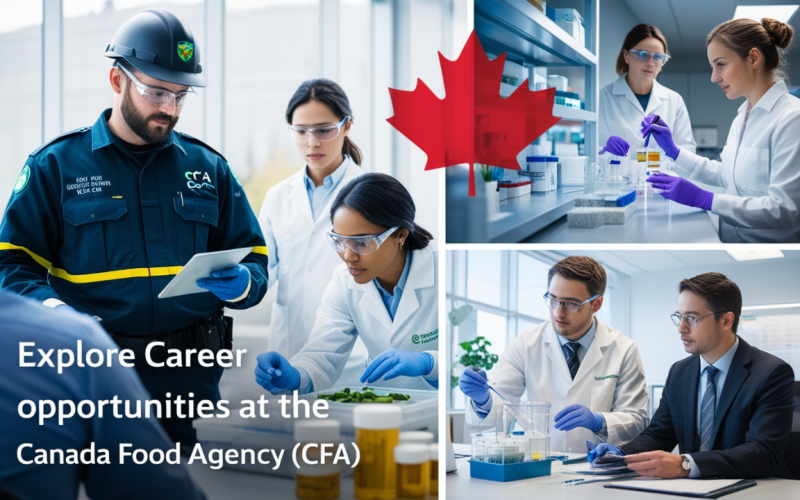Canada Food Agency Jobs, Are you passionate about food safety and public health? Do you want to make a difference in ensuring the food you eat is safe and nutritious? Working with the Canada Food Agency (CFA) might be the perfect opportunity for you.
In this article, we’ll explore the various jobs available at CFA, the qualifications you need, the benefits of working there, and how you can apply. Let’s get started!
Key Takeaways
- Role of CFA in ensuring food safety: CFA plays a crucial role in regulating and monitoring food standards across Canada.
- Types of jobs available at CFA: From regulatory officers to laboratory technicians, CFA offers diverse career paths.
- Qualifications needed for CFA jobs: Educational backgrounds vary, but essential skills and relevant experience are key.
- Benefits of working at CFA: Competitive salaries, health programs, and career development opportunities are among the perks.
- How to apply for CFA positions: Finding job openings, preparing your application, and understanding the interview process are vital steps.
Understanding the Canada Food Agency Jobs
What is the Canada Food Agency?
The Canada Food Agency (CFA) is a federal agency responsible for regulating and monitoring food safety standards across Canada. Its mission is to safeguard public health by ensuring that the food supply is safe, nutritious, and accurately labeled.
CFA works closely with other governmental bodies, industry stakeholders, and consumers to maintain high food safety standards.
Mission and Objectives
CFA’s primary mission is to protect consumers by overseeing the safety and quality of food products in Canada. This includes setting and enforcing regulations, conducting inspections, and responding to food safety incidents. The agency aims to promote a transparent and efficient food regulatory system that supports public health and consumer confidence.
Organizational Structure
CFA operates through various departments, each focusing on different aspects of food safety and regulation. These include:
Regulatory Affairs: Developing and implementing food safety regulations.
Inspection Services: Conducting inspections of food facilities to ensure compliance.
Scientific Research: Analyzing food samples and researching food safety methods.
Policy Development: Shaping policies that influence food safety standards.
CFA’s Role in Food Safety
Regulatory Responsibilities
CFA is tasked with creating and enforcing regulations that govern food production, processing, and distribution. This ensures that all food products meet safety standards before reaching consumers. The agency sets guidelines for food labeling, packaging, and handling to prevent contamination and misinformation.
Public Health Impact
By maintaining strict food safety standards, CFA plays a vital role in preventing foodborne illnesses and protecting public health. The agency’s work helps to reduce the risk of contamination, ensuring that the food supply is safe for everyone.
Types of Jobs Available at CFA
Working at CFA offers a range of career opportunities catering to different skills and interests. Here are some of the key positions you can explore:
Regulatory Officers
Responsibilities
Regulatory Officers are responsible for ensuring that food businesses comply with CFA regulations. They conduct inspections, review compliance reports, and enforce standards to maintain food safety.
Required Skills
- Attention to detail
- Strong communication skills
- Knowledge of food safety regulations
Laboratory Technicians
Job Duties
Laboratory Technicians analyze food samples to detect contaminants and ensure they meet safety standards. They perform various tests, maintain lab equipment, and document their findings.
Educational Requirements
- Diploma or degree in biology, chemistry, or a related field
- Laboratory experience is preferred
Policy Analysts
Role in Shaping Food Policies
Policy Analysts at CFA develop and evaluate policies related to food safety and regulation. They conduct research, analyze data, and provide recommendations to improve food safety standards.
Necessary Qualifications
- Degree in public policy, environmental science, or related disciplines
- Strong analytical and research skills
Support Staff Positions
Administrative Roles
Support staff handle administrative tasks such as scheduling, record-keeping, and managing communications within CFA.
Customer Service Positions
Customer Service Representatives assist the public and food businesses with inquiries, providing information about regulations and compliance requirements.
Qualifications and Requirements
To work at CFA, certain qualifications and skills are essential. Here’s what you need to know:
Educational Background
Different positions require varying educational backgrounds:
Regulatory Officers: Bachelor’s degree in food science, biology, or related fields.
Laboratory Technicians: Diploma or degree in chemistry, biology, or laboratory technology.
Policy Analysts: Degree in public policy, environmental science, or related areas.
Support Staff: Varies based on the role; administrative positions may require a diploma in office administration.
Experience Needed
Relevant Work Experience: Prior experience in food safety, regulatory roles, or laboratory settings can be beneficial.
Internships and Volunteer Opportunities: Gaining experience through internships or volunteering can enhance your application.
Skills and Competencies
- Essential Skills:
- Attention to detail
- Strong analytical abilities
- Effective communication
- Soft Skills Valued by CFA:
- Teamwork
- Problem-solving
- Adaptability
Benefits of Working at CFA
Working at CFA comes with numerous benefits that support both your professional and personal life.
Competitive Salaries
CFA offers competitive salaries that reflect the importance of the roles within the agency. Salaries vary based on position, experience, and qualifications.
Health and Wellness Programs
Employees have access to comprehensive health benefits, including medical, dental, and vision coverage. Wellness programs promote a healthy work-life balance.
Career Development Opportunities
CFA encourages continuous learning and professional growth. Employees can participate in training programs, workshops, and seminars to enhance their skills and advance their careers.
Work-Life Balance
CFA supports a healthy work-life balance with flexible working hours and options for remote work, depending on the role.
How to Apply for CFA Jobs
Ready to pursue a career with CFA? Here’s how you can apply:
Finding Job Openings
Official CFA Website: Visit the CFA’s career page to view current job listings.
Job Boards and Recruitment Platforms: Check platforms like Indeed, LinkedIn, and government job portals for CFA positions.
Preparing Your Application
Crafting a Compelling Resume
- Highlight relevant experience and skills.
- Tailor your resume to the specific job you’re applying for.
Writing an Effective Cover Letter
- Explain why you’re interested in the position.
- Showcase how your skills and experience make you a good fit.
Interview Process
What to Expect
Initial screening interview
Technical interviews based on the role
Behavioral interviews to assess fit within the team
Tips for Success
- Research CFA and understand their mission.
- Prepare examples that demonstrate your skills and experience.
- Practice common interview questions.
Post-Application Steps
Follow-Up Procedures
- Send a thank-you email after interviews.
- Inquire about the timeline for hiring decisions if not provided.
Onboarding Process
- Complete necessary paperwork.
- Participate in orientation sessions to familiarize yourself with CFA’s operations and culture.
Tips for a Successful Career at CFA
To thrive at CFA, consider these strategies:
Continuous Learning
Stay updated with the latest food safety regulations and industry trends. Pursue additional certifications or training to enhance your expertise.
Networking
Build professional relationships within CFA and the broader food safety community. Attend industry events and engage with colleagues to expand your network.
Seeking Mentorship
Find a mentor within CFA who can provide guidance, support, and insights into career advancement opportunities.
Challenges and Rewards
Working at CFA comes with its own set of challenges and rewards.
Common Challenges
- High Responsibility Roles: Ensuring food safety is critical, and mistakes can have significant consequences.
- Navigating Regulatory Changes: Staying abreast of changing regulations requires adaptability and continuous learning.
Rewards of Working at CFA
- Contributing to Public Health: Knowing your work helps protect consumers and improve public health.
- Job Satisfaction and Fulfillment: Playing a vital role in food safety can be highly rewarding and fulfilling.
Frequently Asked Questions (FAQs)
Q1. What qualifications are needed for entry-level positions at CFA?
Entry-level positions typically require a relevant diploma or bachelor’s degree in fields like food science, biology, chemistry, or public policy. Practical experience through internships can also be advantageous.
Q2. How can I increase my chances of getting hired at CFA?
Enhance your application by gaining relevant experience, obtaining necessary certifications, and tailoring your resume and cover letter to highlight your skills and fit for the role. Networking and preparing thoroughly for interviews can also boost your chances.
Q3. Are there opportunities for remote work at CFA?
Some positions may offer remote work options, especially administrative or support roles. It’s best to check the specific job listing for details on work arrangements.
Q4. What is the career progression like at CFA?
CFA provides various opportunities for career advancement through training programs, professional development, and internal promotions. Employees are encouraged to pursue continuous learning to move up within the organization.
Q5. How does CFA support employee development?
CFA offers training sessions, workshops, and seminars to help employees develop new skills and advance their careers. Mentorship programs and opportunities for further education are also available.
My Opinion
Working with the Canada Food Agency offers a meaningful career path dedicated to ensuring the safety and quality of food in Canada. Whether you’re interested in regulatory roles, laboratory work, policy analysis, or support positions, CFA provides diverse opportunities to grow and make a difference.
By understanding the qualifications needed and preparing a strong application, you can embark on a rewarding journey with CFA. Take the first step today and explore the job openings that align with your skills and interests.





